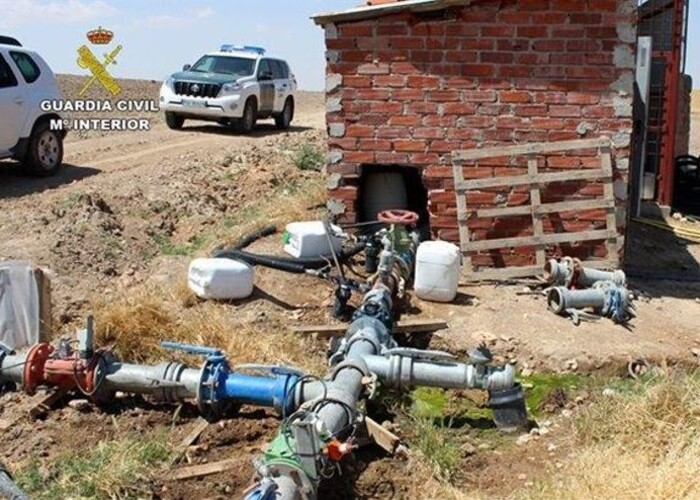MADRID – Today, February 2, is #WorldWetlandsDay. On this occasion, the environmental police of the Guardia Civil announces they have carried out a major macro operation into water theft in Spain.
During Operation Mizu II, officers discovered 1,533 illegal wells and arrested 133 people in connection with water theft. Many others are still under investigation.
The operation consisted of an 8-month inspection campaign in all Spanish autonomous regions. With these inspections, Seprona makes visible the indiscriminate water extraction in a Spain that is suffering from the over-exploitation of its aquifers and a worrisome drought.
Water theft further jeopardizes precious resource
Spain is in an accelerated process of desertification and is the country in Europe that suffers most from the over-exploitation of its aquifers. This is according to a study by the World Wildlife Fund (WWF). In addition to over-exploitation and drought, water theft also threatens to further endanger precious natural resources.
Especially inspections in sensitive areas
Operation Mizu II involved 1,400 Seprona agents from all territorial units. In particular, the inspections were carried out “in particularly sensitive and sensitive areas” such as the Doñana National Park in Andalucia and the catchments of the main Spanish rivers Ebro, Tagus, Guadiana, and Guadalquivir.
Murcia
Murcia, where there is already widespread overexploitation of aquifers, has seen the greatest number of wells and illegal abstractions. Then follow the different provinces in Andalusia, where drought also reigns, such as Málaga, Almería, Cádiz, and Huelva.
More than 2,000 administrative violations
This often concerns urban developments and livestock and agricultural activities. In addition, inspectors have identified many illegal land-use changes. These water thefts are an environmental offense. In total, Seprona agents also identified 2,326 administrative violations.
Mainly economic interests
The current situation of water resources in the Mediterranean environment, and in Spain in particular, involves different situations. They depend on the area and time of year. Seprona warns that multi-interest, primarily economic, overexploitation poses a serious threat not only to the environment but also to this vital resource for life.
Criminal prosecution of water theft is still low
El País writes that progress has been made and that all provinces in Spain have delegated environmental prosecutors. Yet criminal prosecution of environmental crimes is still low in the country. The perpetrators of this type of offense face prison terms of six months to two years and fines of a period of special disqualification from practicing a profession.
Investigators report that the most serious offense can carry a prison sentence of up to five years. The judgment on the seriousness of the facts is usually left to the judge, who does not always have sufficient knowledge to sufficiently master the matter.
The biggest drought of this century
Seprona members have conducted a total of 1,512 inspections across Spain. They mainly looked for illegal wells, boreholes, and water accumulation ponds. In this work, they also discovered other crimes, such as “diversion and fraud with water, wrong planning of the territory or offenses against the public administration”. All this is in the context of what, according to meteorologists, promises to be one of the driest hydrological years of the century.
Unauthorized well drilling
One of the most common illegal water extraction techniques is unauthorised well drilling. Then follows the illegal storage of water and water abstraction directly from riverbeds, streams without permission, and the use of manipulated or unapproved or non-operational water meters.
Death of little Julen in illegal pit
Most wells and pools lacked safety measures, which could pose a danger to people or animals. For example, on January 13, 2019, the two-year-old boy Julen fell into a well (or borehole) 71 metres deep on a farm in Totalán (Málaga). His lifeless body was rescued 13 days later after a major technical operation. That operation was followed day after day by a bewildered country. The sad event highlighted the danger of these common illegal wells on Spanish land.
Especially wells and boreholes
Seprona opens a register based on the collected information. This will contain the locations of the illegal constructions. With geo-reference techniques, inspectors can check and monitor these constructions. Of all structures detected, 74% correspond to wells and boreholes.
In this case, the area around Doñana is again at the top. Here, 10 alleged crimes against the environment could now be clarified. These concerned illegal diversions of water causing damage to ecosystems of the Doñana National Park. An investigation is now underway into 14 people and 12 companies
Water theft in Cuenca
In Cuenca, officers are investigating two individuals and two companies for committing crimes against natural resources and the environment. Another is under investigation for liquid fraud and for carrying out groundwater abstraction through the installation of illegal wells, without the required authorisation. These suspects also used manipulated flow meters to falsify the reading of the illegally extracted water. The stolen water was for irrigation.
Corruption and organised crime in water management
Seprona agents also investigated an employee of the Duero Hydrographic Confederation. He is charged with bribery, corruption, and forgery. The researcher took advantage of the official position he held. He volunteered to farmers to process documents against black payments.
Seprona carried out Operation Mizu II in close collaboration with the General Water Directorate (Ministry of Ecological Transition and Demographic Challenge), as well as with the various watershed organisations in Spain.
A million illegal wells
For example, according to a study by the World Wildlife Fund (WWF), irrigated crops in Spain consume 100 times more water than the more than three million residents of the city of Madrid need in a year. In 2016, a total of 14,948 cubic hectometres of water was for irrigation. In comparison, residents of Madrid used 148 cubic hectometres of water that year. This does not even include illegally consumed water. Researchers estimate in Spain more than half a million illegal sources are “stealing” the common good and “drying up” our future


